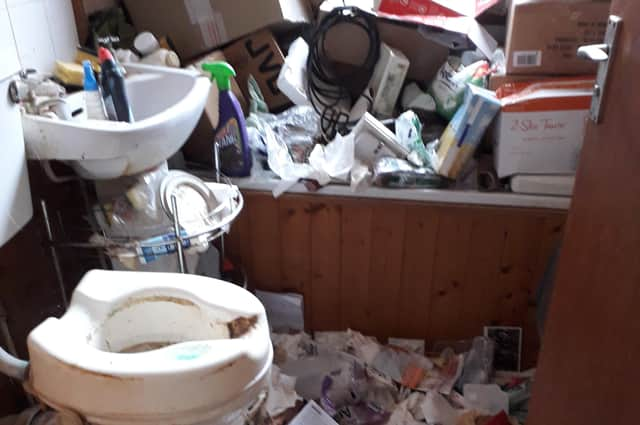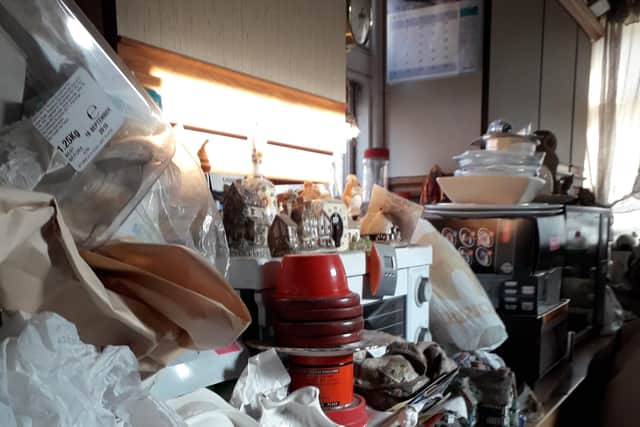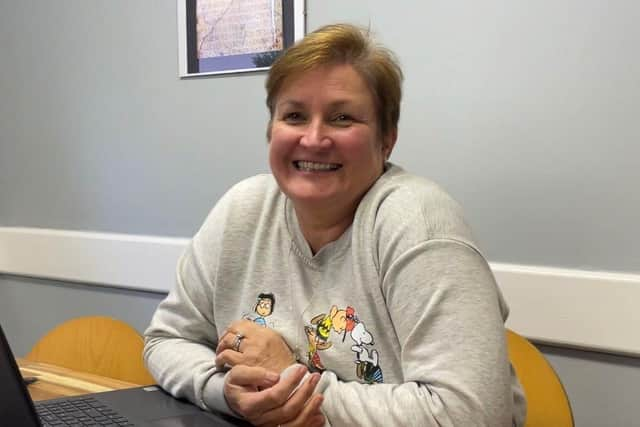NI’s Hoarding Disorder Crisis - Belfast Central Mission says people living in mice and rat-infested properties and need more help


Hoarding is often cruelly parodied on television, with shows depicting an individual living in a grubby home, knee-deep in clothes, newspapers, cartons, whatever, until someone comes along with a skip and encourages them to throw out their possessions. Problem solved.
But the issue of hoarding is more complex than a de-clutter and a deep clean.
Advertisement
Hide AdAdvertisement
Hide AdHoarding disorder was recognised as a mental health condition by the World Health Organisation (WHO) in 2015 and is often linked to other serious mental health issues, such as childhood trauma or clinical depression.


Catherine Glenn, manager for Belfast Central Mission’s Housing Support for Older People project in Belfast, said some television shows can compound the shame and embarrassment felt by hoarders. And when it comes to hoarding, she said appearances can be deceptive.
“You could be sitting on the bus beside someone who is immaculate, but those could be the people who can’t get into the bathroom or the bedroom or the kitchen. What they will do is go to a leisure centre to get showered or changed or use the public toilets. They’ll use launderettes to wash their clothes.
“Those are the people that we call the hidden homeless. They get referred to us after a crisis. We’ll get them if their private landlord or Housing Executive engineers can’t get in to do their yearly service on their boilers.”
Advertisement
Hide AdAdvertisement
Hide AdAccording to Belfast Central Mission (BCM), which works across Greater Belfast and the Southern HSC Trust area in helping older people to stay in their own homes for as long as possible, there could be upwards of 8,000 hoarders across the Belfast area and tens of thousands across Northern Ireland.


“As we’re getting an older population, the younger people now that are maybe going through PTSD or horrific traumas in their life, could potentially be hoarders in their later years,” said Catherine.
“Generally hoarding will start to manifest with people in their 40s. We don’t see those because our service manages over 55s. Most of our service users that hoard would be aged 60-plus and a lot of that can be from trauma through the troubles, or other family issues can create hoarding tendencies as well.”
So what exactly is hoarding disorder?
Lots of us know we probably have a bit too much stuff, and our homes would be calmer and easier to live in after a good sort-out. But for around 2-5 per cent of the population, hoarding can be a real problem.
Advertisement
Hide AdAdvertisement
Hide AdFar more than just being untidy or collecting things, hoarding is a compulsive desire to hold on to things that may or may not have value – and the volume can get out of control, sometimes taking over people’s homes entirely.
Hoarding is considered a significant problem if: the amount of clutter interferes with everyday living – for example, the person is unable to use their kitchen or bathroom and cannot access rooms; and/or the clutter is causing significant distress or negatively affecting the quality of life of the person or their family – for example, they become upset if someone tries to clear the clutter and their relationship suffers.
Hoarding disorders are challenging to treat because many people who hoard frequently do not see it as a problem, or have little awareness of how it’s affecting their life or the lives of others.
Many do realise they have a problem but are reluctant to seek help because they feel extremely ashamed, humiliated or guilty about it.
BCM podcast
Advertisement
Hide AdAdvertisement
Hide AdTo coincide with Hoarding Awareness Week, in an episode of BCM’s new podcast ‘Because Caring Matters’, Catherine highlights that a combination of the hidden homeless – those that live in potentially hazardous situations without any knowledge or contact from the outside world – and a lack of fundamental support, means that hoarding cases are increasing in number and severity.
“Northern Ireland is quite behind the rest of the UK in providing sufficient support for those living in a situation that can be classed as hoarding,” she said.
“The group Hoarding UK has many support networks and resources throughout mainland Britain, and it would be keen to extend those hoarding support units into Northern Ireland as they have recognised a niche for their services here. The problem is figuring out which body or organisation will fund and manage it should it get this far.”
Catherine is joined on the podcast to discuss hoarding by David McCann, a Belfast-based social worker, who acknowledges the existing resources available to those that might present with hoarding issues, including local GPs, social services, and community mental health teams, in addition to BCM’s teams across Belfast, Newry and Co. Armagh.
Advertisement
Hide AdAdvertisement
Hide AdHoarding is a private disorder, going on behind closed doors, its extent only ever realised when it spirals out of control.
“Our worst was a person whose house was floor-to-ceiling with household rubbish that had never been put out. They were buying new duvets every week because they couldn’t get to their bed but didn’t want to be cold. They were climbing through rubbish that was about two foot from the ceiling - and that was right through the house. To get into the house they had to crawl through, what we would call, a goat run.
“Obviously we could never get into that house because the person wouldn’t let us in, because of their feelings of embarrassment and also we have the health and safety of our staff to consider, so we have to do a risk assessment.
“We have seen a good percentage of these houses infested with mice or rats.”
Isolation and vulnerability
Advertisement
Hide AdAdvertisement
Hide AdCatherine added that isolation is also a big issue for hoarders.
“They can’t bring friends or family to their property, because they are ashamed.
“We had one case where the family hadn’t been in the house in over 30 years. The person always met them in the city for coffee or a meal.
“The police had to break in and the policeman had one foot between himself and the ceiling to get up the stairs.”
She said hoarders are also vulnerable to abuse.
Advertisement
Hide AdAdvertisement
Hide Ad“If they can’t manage the inside of the house, chances are they aren’t managing the outside either.
“They are being exposed to break-ins or scammers coming to the front door because they see a vulnerable person. Over the years we have had older people who haven’t been able to manage their properties scammed out of thousands of pounds by people saying they’ll do their gardens, or whatever.”
BCM works to support and keep somebody in their home as long as safely possible and ensure they do not lose their property either through eviction or fire.
“We want people to live as safely as possible and that may involve bringing in the fire service to put in new smoke alarms, do whatever maintenance needs done and providing access so they have somewhere to sit and they’ve got heat and light and a reasonable standard of comfort that suits them.
Advertisement
Hide AdAdvertisement
Hide Ad“In this role you have to be very non-judgemental and you have to take on board what the service users want. We are not there to make fast changes and clear somebody’s house out because that would have a detrimental effect on their mental health.”
She added: “There are people who don’t see their hoarding as an issue, there are those that know it’s an issue but can’t deal with it, and then there are those who are a point where they say they can’t live like this anymore and do need support - those are the ones we can move quicker with, the other two scenarios take us a lot longer and it’s about creating that relationship and that trust and having the patience to work alongside that person.
“The only issue is that very often it’s like a revolving door because if we don’t continue support, it (the hoarding) will start again after a months. It’s a vicious circle.”
She said a “two-pronged approach” to treatment is required.
Advertisement
Hide AdAdvertisement
Hide Ad“They need practical support, but they also need mental health support.
“CBT (Cognitive Behavioural Therapy) is often recommended, but with the age group of our service users they wouldn’t know what CBT is and if you mentioned counselling to them it’s not going to happen - they are of that age where it’s too embarrassing.”
Mostly, BCM wants to create more awareness in Northern Ireland of the causes of hoarding.
“You don’t know what’s going on in somebody’s head for them to actually be a hoarder and what has happened to them in their life to bring them to that situation. We need to make people aware that this is a mental health issue, not just somebody who is lazy,” said Catherine.
Advertisement
Hide AdAdvertisement
Hide Ad*BCM’s new podcast has been launched to highlight and discuss key social issues that affect communities and the first episodes include hoarding, mental health in young people and dementia. ‘Because Caring Matters’ is available on Spotify, Deezer, and more.
*Catherine Glenn can be contacted on 07788984146 or email [email protected]
Comment Guidelines
National World encourages reader discussion on our stories. User feedback, insights and back-and-forth exchanges add a rich layer of context to reporting. Please review our Community Guidelines before commenting.